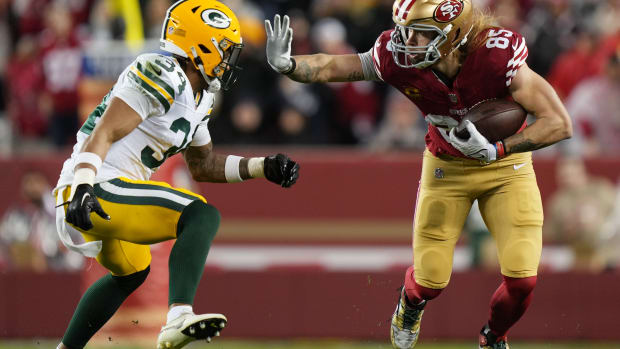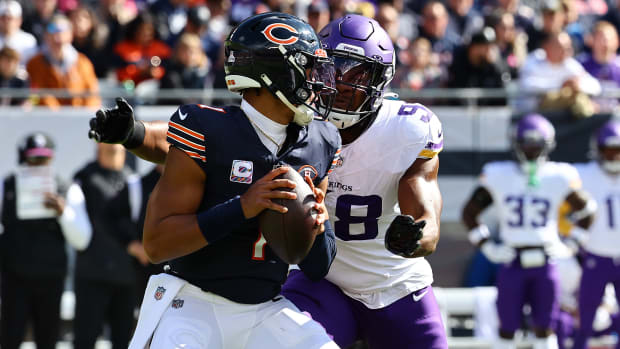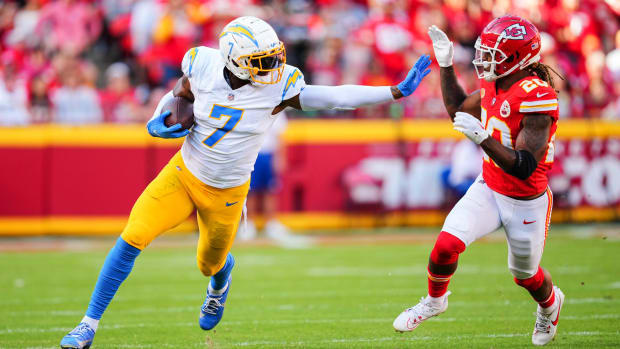Young Man's Game: Is Age Creeping Up on Bears Defense?
When the 2018 Bears let a defensive effort for the ages skip off the upright and crossbar at the north end zone of Soldier Field, the total waste invited emotional outbursts.
The window of opportunity for a dominant defense might close without being supplied a competent offense.
When they went 8-8 last year with a miserable offense and injured defense, the emotion turned to panic and a trade for a veteran quarterback.
The Bears head into training camp later this month with a defense another year older and with three new starters.
It's entirely possible the window of opportunity for that defense has closed already and here's why.
When the season begins, and assuming Tashaun Gipson wins the starting safety battle over younger challengers, the Bears defense will have five defensive starters 30 or older.
Defense in this age of NFL passing offenses requires speed.
Youth and speed go together. Age and speed do not. Age goes better with hamstring pulls, calf pulls and other game-consuming injuries.
This isn't to say the Bears have become a modern day "over the hill gang" like the early 1970s Washington Redskins.
We should all be so young as Akiem Hicks (31 in November), Bustker Skrine (31), Danny Trevathan (30), Robert Quinn (30) and Gipson (30 on Aug. 7).
Players 30 and 31 are young enough to win with in the NFL. The question is whether they're young enough to be a devastating defense, able to carry a mundane offense and win a Super Bowl.
History calls this unlikely.
Based on player ages supplied by Pro Football Reference, there hasn't been a Super Bowl winner with five defensive starters 30 or older since the 2008 Pittsburgh Steelers with defensive end Aaron Smith (32), nose tackle Casey Hampton (31), defensive end Brett Keisel (30), inside linebacker James Farrior (33) and outside linebacker James Harrison (30). That defense had only one player younger than 27, outside linebacker Lamarr Woodley.
In fact, there have been only two Super Bowl winners in the last 11 years with four starters 30 or older, the Baltimore Ravens of 2012 and a defense Bears GM Ryan Pace helped assemble—the 2009 New Orleans Saints.
Those Ravens actually had only three starters 30 and older for half their games. Ray Lewis missed 10 regular-season games with injury but returned after playing just six games and then played all four playoff games.
Going back 11 or 12 years in the NFL these days is like going back a generation in real years because the game changes so much in a short period. At least now, the best defenses are the younger defenses.
Last year there wasn't a single playoff team with five starters who were 30 and older. The Patriots and Ravens had four each.
Making matters worse for the Bears, the Packers built a defense strong enough last year to hold them to three points and 10 points in two games and Green Bay had only one starter older than 27 and that was Traman Williams, their slot corner who was 36.
The two Super Bowl teams had very young defenses. San Francisco's only defensive starter over 28 was 31-year-old Richard Sherman. The Chiefs' Alex Okafor was his team's only defensive starter over 27.
Dominant young defenses must be built through the draft. It's how you get good young defensive players, around 26 or 27 at the end of their first contract.
Pace hasn't done a good enough job drafting players to bring in a full group of defensive starters all at once who are in their early to mid-20s.
He built this defense with a trade for Mack, by signing free agents Trevathan, Hicks, Gipson, Quinn, Skrine, by inheriting Phil Emery draft pick Kyle Fuller and by pairing them with his draft picks: Eddie Jackson, Eddie Goldman, Roquan Smith and most likely Jaylon Johnson.
It's a mix of a familiar defensive scheme with mostly older veterans and a few really young players like Smith and Johnson.
They could be capable of winning a Super Bowl with continued outstanding play, but the more they age they more they'll need help from a competent offense. They're still looking for one of those.
It's the underlying theme to this approaching season. They need to help out this defense before they age out.
2020 Bears Defense
Ages
Khalil Mack 29
Buster Skrine 31
Akiem Hicks 30
Danny Trevathan 30
Robert Quinn 30
Tashaun Gipson 30 (Aug. 7)
Kyle Fuller 28
Eddie Jackson 28
Eddie Goldman 26
Roquan Smith 23
Jaylon Johnson 21
Super Bowl Winners 2010-2019
Defensive Starters 30 and Older
2010 Green Bay Packers 2
2011 New York Giants 1
2012 Baltimore Ravens 4
2013 Seattle Seahawks 1
2014 New England Patriots 3
2015 Denver Broncos 1
2016 New England Patriots 3
2017 Philadelphia Eagles 1
2018 New England Patriots 3
2019 Kansas City Chiefs 1
2019 Playoff Teams
Defensive Starters 30 and Older
Kansas City Chiefs 1
San Francisco 49ers 1
Tennessee Titans 1
Green Bay Packers 1
Houston Texans 2
Buffalo Bills 2
New England Patriots 4
Philadelphia Eagles 3
Minnesota Vikings 3
New Orleans Saints 2
Baltimore Ravens 4
Seattle Seahawks 1
Sources: NFL.com, NFLgsis.com, Profootballreference.com
Twitter: BearDigest@BearsOnMaven




